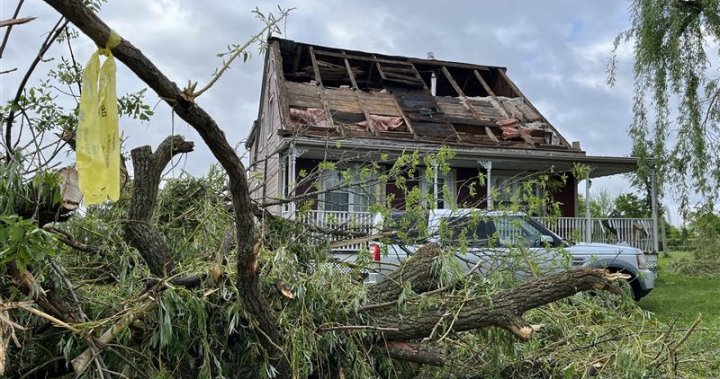As concerns mount over what impact potential tariffs from U.S. president-elect Donald Trump could have on Canada, economists say Canadians should expect an increase in costs from ripple effects if those tariffs do kick into place.
Earlier this week, Trump threatened widespread tariffs on goods being imported into the U.S. from Canada and Mexico on his first day in office, and said he wants action on border security and drug trafficking.
For Canadians, part of any impact if the tariffs go ahead would come from the affect they would have on Canada’s currency.
Stephen Tapp, chief economist with the Canadian Chamber of Commerce, told Global News that tariffs could cause the Canadian dollar to depreciate, which could mean people could see growing costs.
“Let’s say you’re travelling and you’re going abroad, that may mean it’s more expensive for you to go on that vacation,” he said. “But even if you’re staying at home in Canada, there will be a variety of different things that we import that are not necessarily made fully in Canada.”
That could include grocery items, including things like fruits and vegetables that are imported and could see price increases if the dollar sinks.
The dollar already saw a drop after Trump issued his tariff threat, hitting 71.01 cents USD in the early afternoon of Tuesday, the lowest level its hit since May 2020. It has since risen to about 71.37 cents USD as of 3 p.m. Eastern Thursday.
Given the “uncertainty” being felt in Canada with the looming threat, Tapp said it may have some questioning if they should buy some items now or wait.
Want a new car? Buy it now
Tapp said people should be cautious about rushing to buy various items since details on Trump’s proposed tariffs — or if they will even take place — are still unknown.

Get daily National news
Get the day’s top news, political, economic, and current affairs headlines, delivered to your inbox once a day.
But there are some products that could be sensitive to hikes, including vehicles.
Flavio Volpe, president of the Automotive Parts Manufacturers Association, told Global News earlier this week that half the vehicles made in Canada are those of American companies, and half the components and raw materials used come from the U.S.

If tariffs of 25 per cent are added onto components and raw materials, Tu Nguyen, an economist at RSM Canada LLP, has said the cost of vehicles could soar.
“Right now, the North American supply chain requires seamless transportation on imports and exports between the U.S., Canada and Mexico, and if that link is broken, I can only imagine how expensive cars are going to be,” Nguyen said earlier this week.
“For the auto manufacturers, for the dealership to make money, they would then have to pass on some of the cost to the consumers.”
Another item that could see price increases? Major appliances.
“A lot of the primary targets for tariffs are usually, if we’ve learned anything from the previous presidency, things like steel and aluminum and energy, so intermediate goods and components that go into the production of appliances,” Nguyen said.
Tapp said it is difficult to know for sure if appliances or the components that make them could see a price hike from tariffs. But given previous tariffs in Trump’s first term Tapp said it’s “certainly possible” prices could increase.

Don’t stockpile groceries, everyday items
Both Nguyen and Tapp caution against stockpiling items like food or clothing as a way to avoid the potential impact of tariffs, especially as it’s unknown if the tariffs will occur.
Nguyen said while it can be good to purchase items now that are durable and due to be replaced, everyday items can be saved for later as even tariffs may not have an impact to the level some may fear.
“It’s comforting to know that you have a lot of flour and sugar and maybe toilet paper in the pantry, but in the long run it hasn’t been very helpful beyond the psychological comfort that it provides,” she said.
“Things might be a little more expensive in the future, but most likely we will still be able to buy things in the store when we need them.”
© 2024 Global News, a division of Corus Entertainment Inc.





